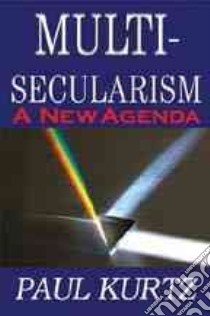Multi-secularism - 9781412814195
Un libro in lingua di Paul Kurtz edito da Transaction Pub, 2010
- € 33.40
- Il prezzo è variabile in funzione del cambio della valuta d’origine
The contemporary world is witness to an intense, sometimes violent controversy about secularism. These trends have been exacerbated by the emergence of fundamentalism, which challenges the secular society and the secularization of philosophical ideas and ethical values. Paul Kurtz has been personally involved in the campaign for secularism throughout his career as a philosopher. This book reflects his participation in this battle and extends his thinking to new areas.
Secularists maintain that the state should not impose a religious creed on its citizens and that it should respect freedom of conscience, the right to believe or disbelieve in the prevailing orthodoxy. This right is guaranteed by the First Amendment to the U.S. Constitution and the Rights of Man enunciated in the French Revolution. Many powerful religious institutions including Islam, Hinduism, Protestant Fundamentalism, conservative Roman Catholicism or Orthodox Judaism, and others do not accept this principle. And many totalitarian countries that claim to be secular nevertheless seek to impose a kind of doctrinaire ideological uniformity, often equivalent to a religious creed.
Kurtz is perhaps best known for his Humanist Manifesto II. Here he takes it to a new level, arguing that secularism today needs to be allied to the emergence of democratic institutions that respect individual freedom andthe pluralistic society. He argues that a defense of secularism entails a defense of the civic virtues of democracy, which include the toleration of dissent and alternative lifestyles and the willingness to negotiate differences.Naturally how this develops is relative to the socio-cultural context in which it emerges. Consequently, secularism will take different forms in different societies, and the term multi-secularism best describes that.
Many people believe that it is impossible to maintain a moral order without the support of religion. Kurtz vigorously denies that, and this volume attempts to explicate the values and principles of secular morality, which he sees as the cornerstone of the open democratic society.
Informazioni bibliografiche
- Titolo del Libro in lingua: Multi-secularism
- Sottotitolo: A New Agenda
- Lingua: English
- Autore: Paul Kurtz
- Editore: Transaction Pub
- Collana: Transaction Pub (Hardcover)
- Data di Pubblicazione: 01 Marzo '10
- Genere: PHILOSOPHY
- Argomento: Secular humanism
- Pagine: 263
- ISBN-10: 1412814197
- EAN-13: 9781412814195


